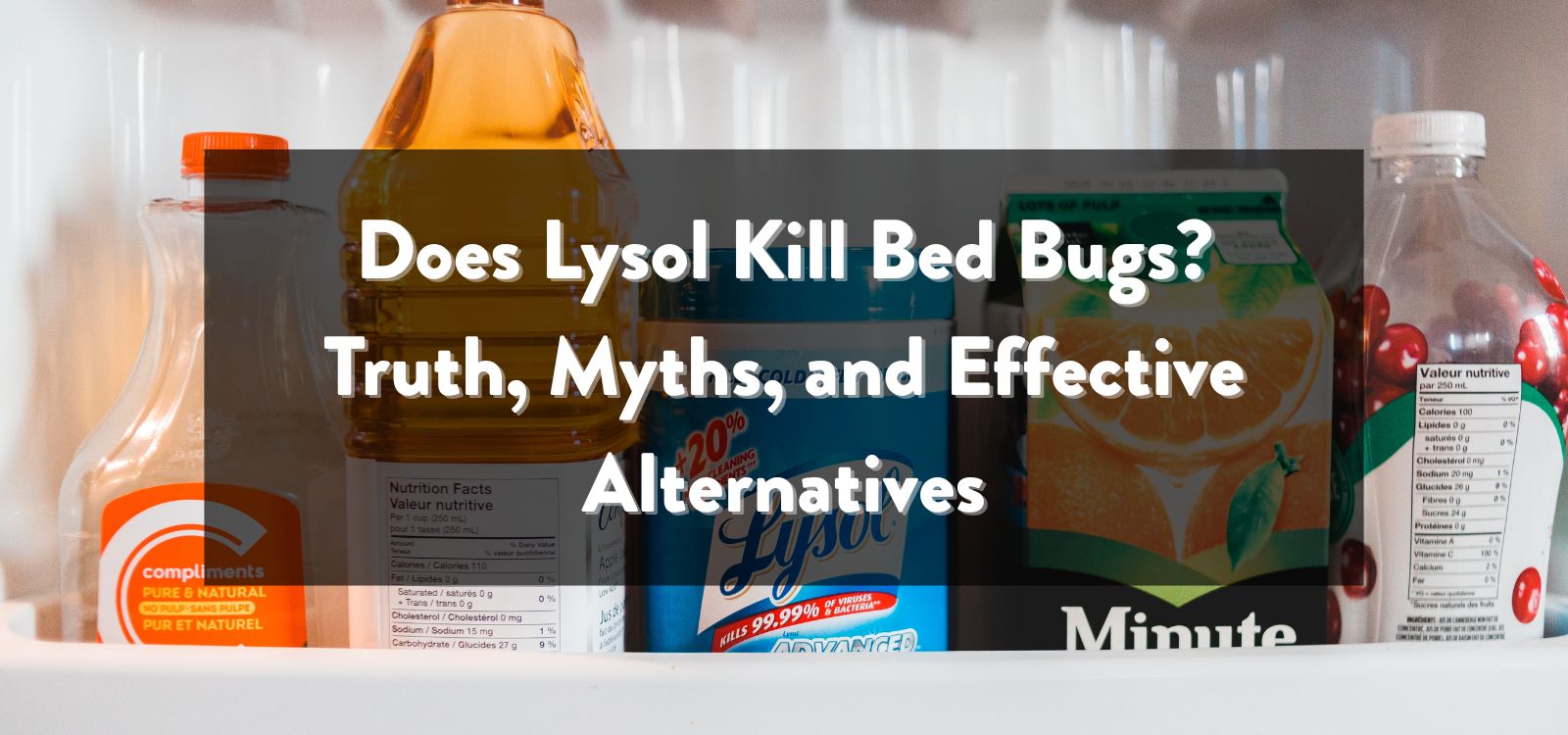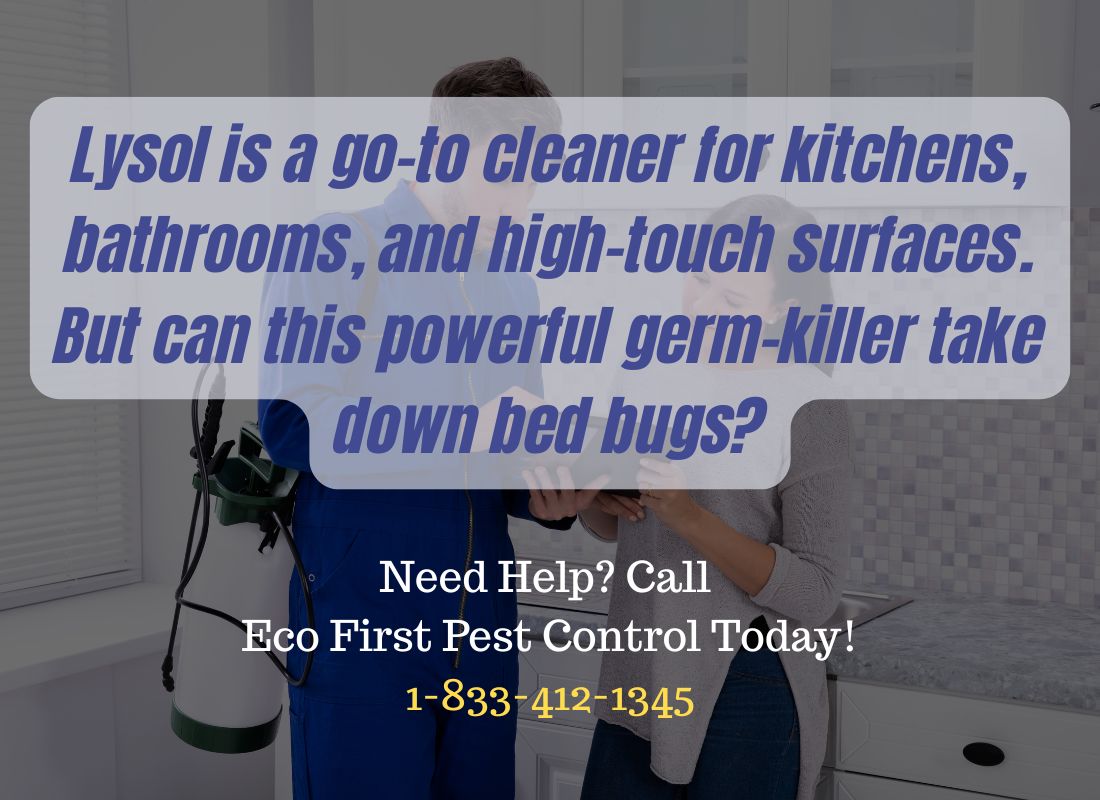
Does Lysol Kill Bed Bugs? Truth, Myths, and Effective Alternatives
Does Lysol Kill Bed Bugs? The Truth, Myths, and Effective Alternatives
Bed bugs are one of the most stubborn household pests, known for their rapid reproduction and resistance to common treatments. If you’re grappling with a bed bug infestation, you might be wondering, does Lysol kill bed bugs? The short answer is, not effectively. While Lysol has some potential as a contact killer, it’s far from a reliable long-term solution. In this guide, we’ll break down how Lysol interacts with bed bugs, its effectiveness, and far better alternatives for a truly bed bug-free home.
Introduction to Bed Bugs and Common Myths
Bed bugs are small, reddish-brown insects that feed on the blood of humans and animals. They’re notorious for their ability to hide in the tiniest crevices, reproduce quickly, and withstand a range of harsh conditions. Given their resilience, many homeowners seek quick, DIY solutions to tackle these pesky invaders.
Understanding Bed Bugs
Before diving into whether Lysol can effectively kill bed bugs, it’s crucial to understand the enemy. Bed bugs are nocturnal, hiding during the day in mattress seams, furniture cracks, baseboards, and even electrical outlets. They emerge at night to feed, leaving behind itchy, red welts as a calling card.
Why Bed Bugs Are So Hard to Eliminate
Several factors make bed bugs especially challenging to eradicate:
- Rapid Reproduction: A single female can lay up to 500 eggs in her lifetime.
- Resistance to Chemicals: Many bed bugs have developed resistance to common pesticides.
- Elusive Hiding Spots: Their flat bodies allow them to hide in the smallest crevices.
- Long Lifespan Without Food: Bed bugs can survive for months without feeding, making starvation tactics ineffective.
Common Myths About Bed Bug Killers
Many people turn to household disinfectants like Lysol, bleach, or even alcohol, hoping for a simple, low-cost fix. However, these methods often fall short. For example, while bleach can kill bed bugs on contact, it’s not practical for large infestations and can damage furniture. Similarly, alcohol has some killing power, but it evaporates too quickly to be fully effective.
What is Lysol and How Does It Work?
Lysol is a popular household disinfectant known for killing 99.9% of germs, viruses, and bacteria on hard surfaces. It’s a go-to cleaner for kitchens, bathrooms, and high-touch surfaces. But can this powerful germ-killer take down bed bugs?

Ingredients in Lysol
The active ingredients in Lysol typically include:
- Ethanol or Isopropyl Alcohol: Known for its disinfecting properties.
- Ammonium Compounds: Effective against a wide range of germs.
- Fragrance and Detergents: For odor control and cleaning.
How Lysol Kills Germs and Bacteria
Lysol works by breaking down the cell walls of bacteria and disrupting the structure of viruses, effectively killing them on contact. However, bed bugs are much more resilient than bacteria, with a hard exoskeleton that provides a degree of protection against chemical sprays.
Can Lysol Kill Bed Bugs on Contact?
In theory, Lysol can kill bed bugs on direct contact by suffocating them or breaking down their outer shell. However, the contact must be direct and thorough, which is nearly impossible given their secretive nature and deep hiding spots. Unlike disinfecting a countertop, you can’t simply spray and wipe away a bed bug infestation.
Does Lysol Kill Bed Bugs?
Many people turn to Lysol as a quick fix when they first spot bed bugs. But does it actually work? The reality is that Lysol's effectiveness against bed bugs is limited and inconsistent.
The Science Behind Lysol’s Effectiveness
Lysol can kill bed bugs on contact due to its alcohol content, which may dehydrate the insects by dissolving their cell membranes. However, bed bugs are notoriously difficult to target because they hide in tight, hard-to-reach areas. Even if Lysol kills some bugs on direct contact, it’s highly unlikely to reach all of them, especially their eggs.
Can Lysol Kill Bed Bug Eggs?
One of the biggest challenges in bed bug eradication is destroying their eggs. Bed bug eggs are highly resilient, and unfortunately, Lysol does not effectively penetrate the protective shell. As a result, even if you manage to kill adult bugs, new ones will continue to hatch, prolonging your infestation.
Limitations of Using Lysol for Bed Bugs
Here’s why Lysol falls short as a reliable bed bug treatment:
- No Residual Effect: Unlike professional insecticides, Lysol doesn’t leave behind a long-lasting residue to kill bed bugs that emerge after application.
- Hard-to-Reach Areas: Bed bugs hide in cracks, mattress seams, and furniture joints, places where spraying Lysol is impractical.
- Risk to Health: Prolonged exposure to Lysol can be harmful to humans and pets, causing respiratory irritation and skin issues.
- Cost and Practicality: Repeated applications are needed, which can get expensive and time-consuming. Plus, the strong smell can be overwhelming.
Why Lysol Isn’t a Reliable Bed Bug Solution
Despite the temptation to reach for that familiar bottle of Lysol, it’s essential to understand why it’s not the answer to your bed bug problem.
Lack of Residual Effects
Bed bugs are masters at avoiding danger. Even if you spray Lysol directly on a few bugs, it doesn’t mean the entire infestation is gone. Bed bugs that emerge later from eggs or come out of hiding will not be affected by any lingering Lysol residue, as it evaporates quickly.
Health and Safety Concerns
Spraying Lysol on mattresses, bedding, and upholstered furniture can leave behind chemical residues that may cause allergic reactions or respiratory problems, especially in sensitive individuals or pets. Inhaling Lysol vapors can lead to dizziness, coughing, and other discomforts.
Cost and Practicality Issues
Using Lysol in large quantities can quickly become costly, especially since you would need to saturate areas multiple times. Additionally, Lysol’s strong odor can make your living space unpleasant, and it can stain fabrics and damage certain surfaces.
Effective Alternatives to Lysol for Bed Bug Control
Since Lysol isn’t a reliable bed bug killer, what actually works? Let’s explore some proven methods:
Professional Bed Bug Control Services
The most effective way to eliminate bed bugs is to call in the experts. Companies like EcoFirst Pest Control offer specialized treatments designed to target bed bugs in all life stages, including eggs. Their professional-grade insecticides and heat treatments are far more effective than household products like Lysol.
Heat Treatments
Bed bugs can’t survive high temperatures. Exposing infested items to temperatures above 120°F for several hours is a guaranteed way to kill both bugs and eggs. You can:
- Use a clothes dryer on high heat for bedding and clothing.
- Utilize steam cleaners for mattresses, carpets, and furniture.
- Hire professional heat treatment services for whole-room eradication.
Diatomaceous Earth (DE)
DE is a natural powder that dehydrates and kills bed bugs when they come into contact with it. Sprinkle it around bed frames, baseboards, and other problem areas. It’s non-toxic but can take a few days to work.
Insecticides and Natural Remedies
While some over-the-counter insecticides can help, many bed bugs are resistant to common chemicals. Look for products labeled specifically for bed bugs and use them according to the manufacturer’s instructions. Natural remedies include:
- Tea Tree Oil: Can repel bed bugs when sprayed.
- Essential Oil Blends: Some mixtures can act as natural deterrents.
- Vacuuming and Steaming: Regularly cleaning and steaming infested areas is a good maintenance practice.
Preventing Bed Bug Infestations
Once you’ve tackled the problem, it’s crucial to prevent reinfestation:
- Inspect Used Furniture: Bed bugs can hitch a ride on secondhand items.
- Seal Cracks and Gaps: Bed bugs can squeeze through tiny openings in walls and floors.
- Encasements: Use mattress and box spring encasements to keep bed bugs out.
- Regular Inspections: Check your bed and surroundings frequently, especially after traveling.
For a more comprehensive approach to getting rid of bed bugs at home, visit the Ultimate Guide to Bed Bug Elimination.
DIY Bed Bug Control: What Actually Works
If you’re determined to tackle the problem yourself, here are some practical steps:
- Vacuum Regularly: Focus on seams, crevices, and under furniture. Dispose of vacuum bags immediately.
- Steam Treatment: Use a high-heat steam cleaner to kill bugs and eggs.
- Wash and Dry: Wash infested fabrics on high heat and dry thoroughly.
- Encasements: Seal mattresses and box springs to trap and isolate bugs.
- Isolation: Move your bed away from walls and use bed bug interceptors under legs.
For persistent infestations, it’s best to seek professional help from EcoFirst Pest Control’s Bed Bug Services.
When to Call a Professional Exterminator
If your DIY efforts aren’t making a dent, it’s time to bring in the pros. Call an exterminator if:
- You’re Still Seeing Bugs After Treatment: Bed bugs multiply rapidly, so early intervention is crucial.
- Bites Keep Appearing: Even after multiple cleanings and treatments.
- You Can’t Identify the Source: Professionals can assess and isolate the infestation.
- Severe Infestation: If bed bugs are in multiple rooms or floors.
A professional service like EcoFirst Pest Control provides thorough inspections and tailored treatments that address even the most severe infestations.
Is Lysol Worth the Effort for Bed Bugs?
In the battle against bed bugs, Lysol simply doesn’t hold up as a long-term solution. While it might kill a few bugs on contact, it’s not practical or effective for widespread infestations. Instead, opt for proven methods like heat treatments, professional pest control, and consistent cleaning routines. By taking the right steps, you can rid your home of bed bugs and keep them from coming back.
FAQs
-
Can you spray Lysol on your mattress for bed bugs?
- While it might kill bugs on direct contact, it won’t eliminate an infestation and can damage the fabric.
-
Is Lysol harmful to pets if used for bed bug control?
- Yes, prolonged exposure can be toxic to pets and should be avoided.
-
How long does it take for Lysol to kill bed bugs?
- Lysol can kill bugs instantly on contact, but it doesn’t address hidden bugs or eggs.
-
Are there any natural alternatives to Lysol for bed bugs?
- Yes, diatomaceous earth and essential oils can offer some relief.
-
Can Lysol prevent bed bugs from spreading?
- No, Lysol lacks residual effects and cannot stop migration to other areas.